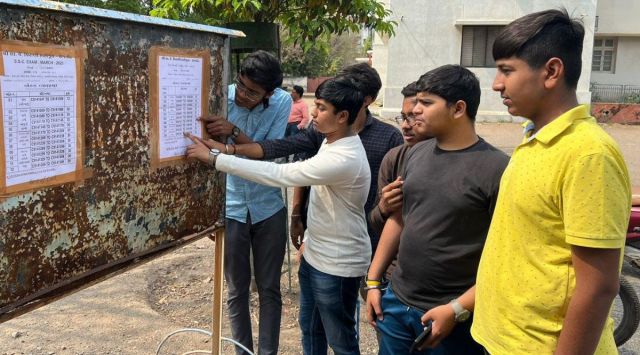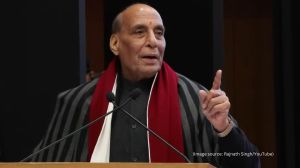NCERT key deletions, AICTE’s new courses, NEET UG eligibility criteria, PSEB result— Top education news this week
With JEE Main 2023 session 2 concluding and changes being announced in NCERT curriculum, CBSE board exam pattern and more, a lot of updates have taken place in the education sector. Check them here
 A lot of updates have taken place in the education sector. Check them here. (Representative image. Express image)
A lot of updates have taken place in the education sector. Check them here. (Representative image. Express image) Be it changes in proposed style of board exams, NCERT books, TOEFL’s structure, US study visa fees, or updates in NEET UG 2023 eligibility, and JEE Main answer key, a lot has happened in the education sector this week. Take a look at the main stories, in case you missed it…
CBSE Board Exams: Semester system in Class 12th, flexibility in choice of subjects and more
The Ministry of Education recently released the National Curriculum Framework for School Education (NCF). The expert panel has clarified that there will be no change in the exam pattern of Classes 9 and 10, and students will continue to appear for an annual exam, rather than introducing a semester system. “A semester structure in these classes is possible to construct but is unnecessary since all students will do all the essential courses,” the draft stated.
However, the same has not been recommended for Class 12. The panel suggests that students should slowly be introduced to semester exams in board exams classes too. “Modular Board Examinations will be offered as opposed to a single examination at the end of the year. The final certification will be based on the cumulative result of each of the examinations,” the NCF draft states.
Another change that this year’s NCF suggests is giving students the flexibility to choose their subjects in higher education, rather than picking up pre-selected subjects. The draft suggests that when students choose a discipline, they have to complete four choice-based courses in that discipline, but all subjects should not be limited to it.
NCERT book revisions
The NCERT consulted 25 external experts to carry out its syllabus rationalisation exercise as part of which it spiked portions on Mughals, Mahatma Gandhi, his assassin Nathuram Godse, reference to Hindu extremists and the 2002 Gujarat riots, among others, from school textbooks.
For history textbooks, the five experts who were consulted were Umesh Kadam, a professor of history at Jawaharlal Nehru University and a member secretary at the Indian Council for Historical Research; Hindu College associate professor (history) Dr Archana Verma; Delhi Public School, RK Puram, teacher (head of department of history) Shruti Mishra and two Delhi-based Kendriya Vidyalaya teachers Krishna Ranjan and Sunil Kumar.
‘If we keep losing our young minds because they don’t see a good future, that’s not a good thing’
Hargurdeep Singh Saini, better known as Deep Saini, now 68, is the first person of Indian origin to head the 202-year-old university in Canada, ranked 31 in the world and number 1 in Canada in the QS Rankings 2023. Earlier he also served as V-C of Dalhousie University, Canada and University of Canberra, Australia.
With thousands of youths from India, nurturing Canadian dreams, trying hard to crack the American code every year, Saini tells The Indian Express the risks of brain drain, the need to strengthen India’s higher education system and good old memories of PAU. Read the full interview here
Changes in TOEFL’s structure
The Educational Testing Service (ETS) has announced several changes and modifications to the Test of English as a Foreign Language (TOEFL). According to the revised regulations, the TOEFL iBT test has been shortened by an hour now. The test will now take less than two hours to complete, earlier the duration of three hours. For this, the test will now have a new, more modern ‘Writing for an Academic Discussion’ task, which will replace the previous independent writing task. The reading section has also been shortened and all unscored test questions have also been removed.
One of the biggest changes being brought in is that the test takers will see their official score release date upon completion of the test, in addition to receiving real-time notification of changes to their score status.
PSEB Class 8, 10 Result 2023 updates
The Punjab School Education Board (PSEB) will declare the Class 8 results around April 25, an official from the Punjab Board told indianexpress.com. Once released, students will be able to check their score at the official PSEB websites — pseb.ac.in or partner website indiaresults.com.
“The result for Class 8 will be released on or before April 25, but the result declaration date has not been finalised yet,” an official told indianexpress.com. “The result declaration date for Class 10 has also not been finalised yet, but can be expected in May,” he added.
West Bengal over-reported midday meals worth more than Rs 100 crore, diverted funds: Centre report
A Centre-state “joint review” of the implementation of the PM Poshan scheme in West Bengal has flagged “great concern” over 16 crore midday meals worth “more than Rs 100 crore” being “over-reported” by the local administration between April and September last year.
In its report, the Joint Review Mission (JRM), set up by the Ministry of Education in January this year, has also questioned the diversion of funds meant for the scheme to pay compensation to fire victims, misallocation of food grains, cooking of rice, dal and vegetables up to 70 per cent less than “prescribed quantities”, and usage of expired packets of condiments.
How can BTech graduates with a low GPA excel in research-oriented engineering careers?
The education system in India gives high importance to a student’s academic performance, which is based on theoretical examinations. Students usually pass these by rote learning — a practice that begins in schools. With the infrastructure and staff that we have at the moment, very few schools can teach students to learn in a practical and meaningful manner.
IITs/NITs follow a very rigorous theoretical curriculum of engineering, but they are lacking the support system and blueprint to guide undergraduate students to transition into a career in research and core industry.
AICTE’s new courses
The All India Council for Technical Education (AICTE) has launched new courses which are BTech Electronics VLSI Design and Technology and Diploma in IC Manufacturing. Any number of AICTE affiliated colleges/ universities/ technical institutions are allowed to opt for the newly-launched courses. Check scope, curriculum, average salary etc of these courses.
NEET UG 2023: NTA revises eligibility criteria for Indian candidates abroad
The National Testing Agency (NTA) has made changes in the eligibility criteria for OCI, PIO card holders appearing in the National Eligibility cum Entrance Test Undergraduate (NEET UG) 2023.
As per the revised guidelines, Indian nationals, NRIs, overseas citizen of India (OCI), persons with Indian origin (PIO) and foreign nationals are eligible for admission in medical, dental, ayurveda, siddha, unani and homeopathy colleges.


- 01
- 02
- 03
- 04
- 05





























